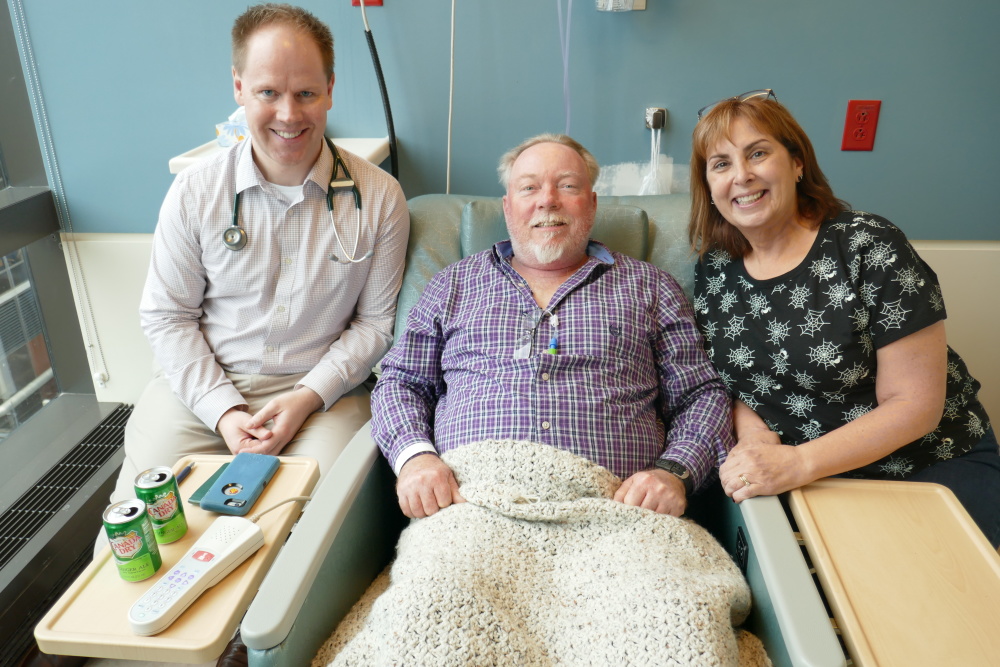It was anything but a routine hospital visit, but Bradley Graham handled his 100th chemotherapy infusion like he has all the rest — with a friendly smile and a steely determination. That’s his makeup.
As a principal engineer specializing in submarines and nuclear emergency planning, and a Navy veteran who served more than 20 years on subs, Graham is an expert at three things: getting in and out of tight spaces, using logic to tackle challenges, and staying the course. On the way to becoming the longest-serving participant on a clinical trial for advanced esophageal and stomach cancer, he has put all these skills to good use.
“You become a better problem-solver, dealing with what’s right in front of you, with a less emotional viewpoint,” says Graham, 57, of his background. “It’s a matter of ‘How am I going to handle this?’ Attitude and approach have a lot to deal with it.”

Graham’s resolve and cool-headed reasoning has helped him remain on the trial for six years, despite numerous other health issues during that period. The biggest came in 2017, when he learned that he needed quadruple bypass surgery that would necessitate temporarily going off his chemotherapy.
“I talked it over with my cardiologist, and he said he could try putting in some stents to unclog my coronary arteries instead,” explains the father and grandfather of four. “It turned out fine, and Dr. Yurgelun moved some things around for me on the trial to make it all work.”
Complete response
Matthew Yurgelun, MD, Graham’s oncologist in the Center for Esophageal and Gastric Cancer at Dana-Farber/Brigham and Women’s Cancer Center (DF/BWCC), recommended Graham for the clinical trial developed at Dana-Farber Cancer Institute. The two have bonded through the ups and downs of treatment.
Survivorship for stage IV esophageal cancer is usually measured in a year or less, says Yurgelun, but Graham beat those odds a half-decade ago.
“Brad has had an unusually good response to his treatment — a complete response — and, importantly, he has been able to maintain this phenomenal response and remain on therapy ever since,” says Yurgelun. “It’s not every day we see someone with esophageal cancer thriving this well, and it’s all the more exciting that it’s on a clinical trial.”
It was that option which Graham credits for his decision to come to DF/BWCC.

When his cancer was diagnosed in August 2013, it had already metastasized beyond his esophagus. Doctors said there was no way of finding and removing all of it surgically; chemotherapy was the best option. He and his wife, Susan, met with oncologists at two cancer centers. They liked both, but while one offered a standard chemotherapy protocol, the other — DF/BWCC — had a spot for him on a clinical trial.
“I’m an engineer, so I used that thought process,” says Graham. “A trial is an unknown, but the five-year survival for my cancer was three percent on a standard protocol. So, did I want to be on a trial? Sure.”
Drives and walks
The DF/BWCC campus in Boston is a two-hour drive from Graham’s home in Connecticut, and the trial requires infusions each three weeks, but long trips are old hat to this Navy man. Each third Thursday he and Susan rise at 3:30 a.m., get out of the house an hour later, and arrive at the cancer center by 6:30 a.m.. After meeting with Yurgelun, Graham gets blood work and then an infusion. By lunchtime, they are usually on the road.
“Sometimes we’ll stay for the afternoon, or maybe see a Red Sox game, but I like to get home as early as possible,” Graham says. “I still put in 40 to 50 hours a week as an engineer, and more often than not, I’m back at work the next morning.”
He also engages in two seasonal passions: golf in the summer and serving as coach of a high school robotics team in the winter. Graham loves both, along with the extra family time the trial — and the support from Yurgelun and Susan — has given him.
“It’s not just my journey; it’s hers as well,” says Graham. “She’s been a saint through the entire process, and the staff at DF/BWCC are the most compassionate, caring, and dedicated ever.”
His tri-weekly trips to DF/BWCC have become so routine that Graham is sure he would have lost count of his infusions long ago. Because the trial requires him to fill out a log, however, he noticed No. 100 was coming up this summer. He didn’t want to make a fuss, Susan and his caregivers did – so there were balloons and cake and a “100” pin for the guest of honor.
Now, with his big milestone in the rear-view mirror, he plans to keep going as long as he can.
“I had my 104th infusion on Halloween,” he says with a laugh, “but who’s counting?”
